Meet four of the countryside’s ‘everyday heroes’
Recent news has reminded us all of the amazing work the emergency services do.
And across the UK, country people are doing fantastic work as ‘emergency responders’ alongside their day-jobs.
Here we meet four of them and find out what they do and why they have chosen to do it.
See also: How to stay safe riding a horse on the road
- Cathy Fairman, Cornwall Search and Rescue Team
- David Slack, Kent Police’s roads policing unit
- Rebecca Morris-Eyton, Duddon and Furness Mountain Rescue volunteer team member
- Martin Bell, Leverton Fire Station, near Boston, Lincolnshire
Cathy Fairman, Cornwall Search and Rescue Team
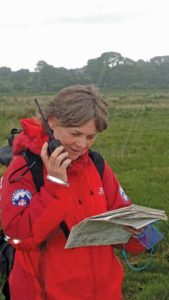
Cathy Fairman says navigation is one of the skills she learned through her training
Tell us a bit about yourself
I’m married with five children aged between 16 and 26. My husband Dominic and I run our 80ha organic farm in Bodmin Moor, Cornwall, where we keep 10 North Devon/Galloway cows for beef and 100 Cheviot/Romney ewes, producing mutton for local customers and sausages and burgers for our campsite.
We both have part-time jobs too. I’m a staff nurse in a community hospital and Dominic is a councillor. I’ve been involved with Cornwall Search and Rescue Team since 2012 and I’m the medical officer for the East section.
How did you get involved with the search and rescue?
I got talking to an agency nurse who told me about a search and rescue team she was a medical officer for.
She described fun-filled training, learning new skills and adrenaline-filled searches – this sounded right up my street, plus they needed more women and medically minded people.
My children were all growing up fast and I felt ready for a new challenge.
What does your role entail and why is it needed?
My role has developed over the years. I previously had no navigation, communications or rope-work experience, but I loved learning new skills, especially navigation.
I found this a challenge, but it’s now one of my favourite pastimes.
It took eight months to get up to team standards, and then I quickly began teaching first aid at sessions and am now a medical officer.
I have done additional training which enables me to administer medications including analgesics, oxygen and Entonox [a pain medication], as well as lead the care at an incident site.
What specialist training have you had to do the job?
We have a rolling programme including field-search techniques, communications, first aid, navigation, water-rescue, rope-work and working with Search and Rescue Dogs Association.
We also have training and awareness of traumatic incident support, diversity and equality and dealing with vulnerable individuals.
I have been selected to go on a Mountain Rescue England and Wales national course to gain a hill party leader’s qualification, which will allow me to be a team leader on searches.
It carries a lot of responsibility and means I will be in charge of a team of four or five, delegate roles, plan my search and manage the site once the missing person or casualty is found.
Why do you do it/what do you get from it?
I love doing it – it has allowed me to help others in a completely new way as well as challenging my fears – rope-work can be quite scary.
We have fun social events and have a laugh at some point every time we meet up for training or call-outs. We are a very diverse group of personalities and I’ve noticed most team members have developed in a positive way since joining, either by overcoming shyness, fears, mental health issues or by being able to finally “fit in” somewhere.
Everyone looks out for each other and I’ve made some good friends.
How much of your time does it take up?
Training is once a week and call-outs can happen anytime day or night; we are one of the busiest teams with 40 events in 2016.
That includes rescue covers, which means we’re on hand to deal with incidents at running and walking events including the New Year’s Day Brown Willy Run, Eden Project Marathon and Bodmin Moor 10 Tors charity walk.
Any particular incidents stand out?
In February, a woman, her elderly mother and their dog were walking on Roughtor – a local landmark –and the weather had changed from a sunny afternoon to a misty, wet evening, and they became disorientated on the way back to their car.
They called the police at 5.30pm to say they were lost, then ran out of battery and had no further contact. We were alerted, and as I lived locally, myself and another team member searched the moors to the south of Roughtor.
The weather was poor – visibility was only 10m due to darkness and thick fog – so we planned our route taking note of features like bearings, walls and cairns to aid our navigation.
We were anxious to find these two older people as we knew hypothermia can quickly set in on exposed moorland and the situation was potentially life-threatening.
After about an hour of searching, they were found safe, but cold, wet and very frightened.
After being reassured and assessed for hypothermia they left safely to return to their holiday cottage. The only casualty was one of the team who was bitten by their very protective dog.
How does it fit in with your day job?
My farming work can be quite flexible unless it’s haymaking time, shearing or TB testing, so I’m usually able to attend a high percentage of call outs.
Other events I have to roster in, especially around my nursing work.
David Slack, Kent Police’s roads policing unit
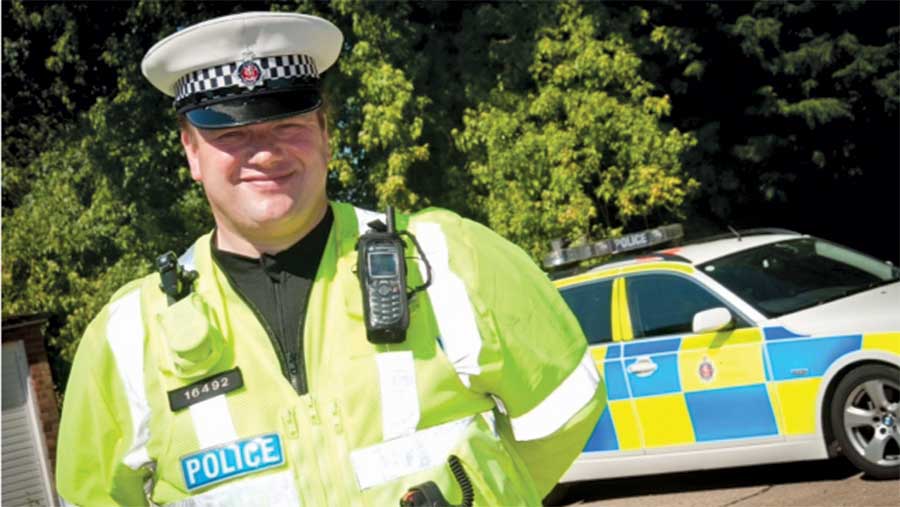
David Slack
Tell us a bit about yourself
I’m married to Emma and we have two children aged seven and five.
I’m the managing director of the 3,642ha Yattendon Estate – a farming and property business in West Berkshire. It operates a large farm growing cereal crops including wheat, barley and oilseed rape, alongside two tenanted farms.
I am also a special constable.
How did you get involved?
I have been a special constable for 30 years. I’ve had a long interest in the police and had a friend who was a special constable with the Metropolitan Police.
Policing was a potential career choice, but I was working in property at the time and just never got round to joining up.
This is a way of being able to do both.
What does your role entail and why is it needed?
Initially, I worked as an ordinary special, working my way up to chief inspector, but about nine years ago I was looking for a new challenge so chose to take a drop in rank and go through specialist training to join the roads policing unit.
Our core day-to-day job concentrates on drink-drivers, drink and drug drivers, drivers using mobile phones, drivers and passengers not wearing seatbelts, speeding and people driving without due care and attention.
As far as the public are concerned, when someone turns up in a uniform, they just see a police officer, they do not know we are specials.
They expect the same standards as they do with our regular colleagues.
We wear same uniform, drive the same cars. We are here to support our regular colleagues in whatever way we can.
What specialist training have you had to do the job?
I have completed a BTEC in roads policing, which also qualifies me as a vehicle examiner, and means I can take a vehicle off the road due to defects.
I’m an advanced response driver – answering 999 calls with no limit on response speed – and am also trained in the highest level of police driving tactical pursuit and containment.
I’m also a qualified police first responder – this is like a community first responder but is advanced so we can deal with people who have lost limbs, need defibrillators, oxygen, chest plugs and tourniquets. It’s more for dealing with crash victims, as well as those suffering heart attacks.
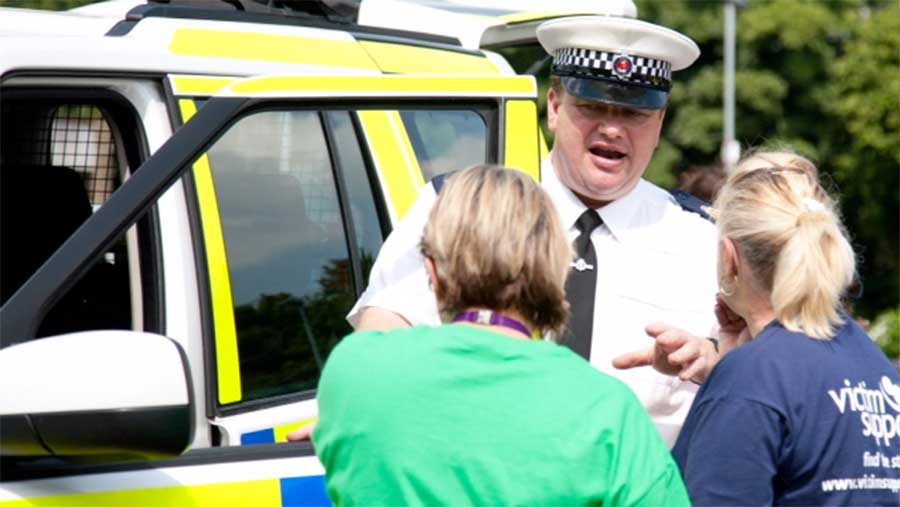
David Slack says people expect the same standards from special constables as regular police officers
Why do you do it/what do you get from it?
I feel it’s the area of policing where you can make the most difference. It’s not all about booking and ticketing people – it’s about protecting life and educating people (we go into schools and do talks with children as part of our job).
If I can get to a crash scene and make a difference by saving a life, then that’s fantastic. If all I can do is be there with someone, then that’s what I have to do.
Whether we’re attending a crash scene or taking drink/drug drivers off the road, we are saving lives and reducing casualties, which is why I find it so rewarding.
Also, I’m a bit of a petrol-head. I did my HGV class one for fun, and I’ve always loved cars and lorries, I’m also a steam train driver.
How much of your time does it take up?
Driving courses are usually a month long, full-time; while my BTEC took about 10-12 weekends. Training is ongoing and I usually work two shifts a month.
Any particular incidents stand out?
I have dealt with every type over the years including shootings, stabbings and helping to look for IRA bombs. My biggest fear now, as a father, is coming across an accident involving children.
Recently, we had a car carrying four people go under the back of a lorry. I was the first traffic on the scene and had to co-ordinate things.
We had two air ambulances attending, had to start taking the first eyewitness accounts and manage the scene until the accident investigators arrived.
I also had to take the parents of one lady on a blue-light dash to the hospital so they could get there in time – fortunately, she made it. It was a horrific accident.
How does it fit in with your day job?
I have to make sure there is no overlap so it doesn’t impact on my day job; although we do shifts we can still be called out if there is a major incident.
Rebecca Morris-Eyton, Duddon and Furness Mountain Rescue volunteer team member
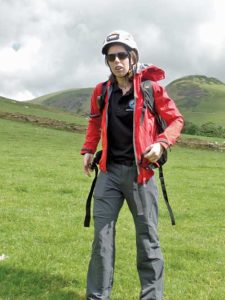
Rebecca Morris-Eyton has been a mountain rescue volunteer for five years
Tell us a bit about yourself
I live on my parents’ 250ha dairy and sheep farm near Millom in Cumbria, where I work full or part-time depending on the season.
We keep 1,000 sheep including Swaledales, mules and composite breeds, as well as 220 Holsteins for milking and 300 youngstock.
When I’m not on the farm, I work in hospitality at a local hotel and have been volunteering with mountain rescue for five years.
How did you get involved with mountain rescue?
I love being outside, out walking, and I wanted to put something back into that.
I’ve always admired the mountain rescue team and what it does, and I wanted to be able to help the people who needed it out there.
My grandfather Jack helped found the team and my dad Robert was also a member when he was younger and still supports us with extra, specialised vehicles such as the tractor, snowplough and quad bike when we need help with access.
What does your role entail and why is it needed?
Our team covers a large, mountainous area around the south lakes. My role also involves taking part in – and giving – training once a week or fortnight depending on the time of year.
We are an emergency service in our own right and also back up the others with our specialist equipment. We take part in search-and-rescue in mountainous terrain, provide casualty care and evacuation, and search for lost people in non-hill environments.
We support the other 999 services, give ambulance support in winter conditions and swift water rescue.
We have people co-ordinating from our headquarters and making sure everyone knows what they’re doing. If there’s a search on, we’re divided up into groups and given an area to cover.
We’re also a charity – it costs about £30,000/year to keep the service going and, although we do get a bit of government funding, we have to raise our own funds.
What specialist training have you had to do the job?
Our training covers such things as how to move and be safe in the water, training with ropes and specialist medical training.
Team members are encouraged to specialise in certain areas such as white-water crag rescues; while mine is more in control and command, directing people from the control room.
Why do you do it/what do you get from it?
I love getting to use my training and helping people in all weather. Sometimes it means we are out in such bad weather that most people would be hibernating – but we are prepared and trained. It is a challenge that I enjoy.
It has also given me confidence if I do come across an incident.
The other Friday night there was a bike accident outside the farm and I had the confidence and knowledge to look after the rider until the ambulance arrived.
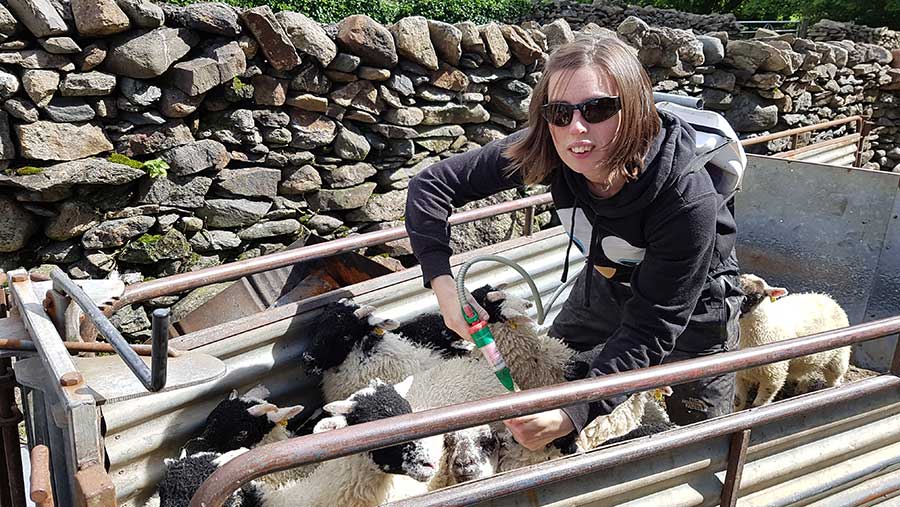
Rebecca Morris-Eyton lives on her parents’ 250ha dairy and sheep farm near Millom in Cumbria
How much of your time does it take up?
I usually get a call out every couple of weeks, plus we have training on top of that. It averages about four hours a week.
Any particular incidents stand out?
We once had to help neighbouring Wasdale Mountain Rescue with a runner who had fallen a long way and was quite badly injured.
The rescue needed two helicopters. One couldn’t winch the casualty up and the second didn’t have a paramedic on board – the helicopters don’t always fly at night, or can’t get there, or like this one, don’t have the qualified personnel on board.
This could have resulted in a very long complicated stretcher carry.
It highlighted how we have to be prepared for anything, be adaptable, work as a team, with other teams and also different agencies. If one or neither of the helicopters couldn’t get there, it may have been a very different story, but thankfully we had a happy outcome.
We also played a big part in the recent floods. My role was in the control room, updating members on what was going on and where they were needed; evacuating people as quickly and safely as possible.
How does it fit in with your day job?
I usually get called out once every couple of weeks, while training is in the evening.
I’m very fortunate my family is very supportive. They cover my work as much as possible when I get a call out, while the other places I work are very supportive too and also let me go.
Martin Bell, Leverton Fire Station, near Boston, Lincolnshire
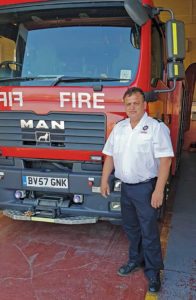
Martin Bell
Tell us a bit about yourself
I’m married to Judy and we have three children Leanne (21) and twins Jack and Jessica (16).
Up to two years ago I grew vegetables and arable crops – now I’ve scaled it back. It’s all arable – 40ha of barley and wheat and 50ha of pumpkins. I also work with my cousins on their horticultural nursery.
I’ve been a retained firefighter at Leverton Fire Station for 30 years, where I’m now the watch manager.
How did you get involved with the fire service?
It all came about when two of my friends joined up – they were both enjoying it, so a month later I went along with them.
It was nice to be working with a crowd. I was spending anywhere between 10 and 14 hours a day on a tractor driving up and down on my own, which can be lonely, so it’s good to be with others.
What does your role entail and why is it needed?
Retained firefighters do the same job as full-time officers, it’s just that we’re not permanently based in the station – we have other jobs too.
I’m in charge of the station, which has 10 retained firefighters. My role entails recruiting and dealing with the running of the station. We have a set training program; I’m mainly left to my own devices, so it’s up to me to deliver it how I want.
When we get called out to incidents, I can be in charge of two or three fire engines until an officer of a higher rank gets there. We’re also trained as first responders – first paramedics on the scene of an accident or if someone falls ill.
What specialist training have you had to do the job?
Our training is updated all the time, but we do pretty much everything full-time firefighters do. We undergo emergency blue-light training for fire engine and cars, breathing apparatus, pumps and ladders and medical training.
A few jobs have been taken away from us, so we don’t deal with chemical spills.
Why do you do it/what do you get from it?
It’s an enjoyable hobby. I’ve given the best part of my life to it and I shall stay until they tell me I can’t do it anymore.
The fact you can make a difference to someone’s life is so rewarding. I’ve learned a lot as well, which has stood me in good stead and made me a better person.
I’ve made some great friends and financially things have improved since I first joined. Thirty years ago I actually used to lose money by doing it, as I would get less pay than I was getting farming, but that’s changed now.
How much of your time does it take up?
We usually train one night a week and then the odd weekend. We might go a month without a fire call and then get five in one day.
It averages out at about 100 fire calls a year and 150 co-responder incidents as we’re getting more of those now, usually three or four a week.
It has definitely affected my life – more by just being on call rather than actually out on a shout. As I used to say to my wife: “We can’t go out today because I’m on call.” Whole weekends would be affected when I didn’t actually get called out. It’s affected the children growing up too, missing out on days out.
Any particular incidents stand out?
We’re looking at life and death all the time and, after the first accident you come across, you start driving your car 10mph slower. It’s always good to hear people are OK after we’ve spent hours freeing them.
One of the biggest incidents I dealt with was a fire at B&Q in Boston several years ago. It was a massive fire, but had only just started when we got there, within minutes the building was engulfed because of the stuff in there.
A couple of years ago Boston was flooded and we were involved pumping water and helping people get to safe places. That was quite a sight.
How does it fit in with your day job?
If I’m gone five hours then I just have to make the time up on the farming side of things; there isn’t anything that can’t be done a bit later.
When I first joined and we attended a big fire we could be there 14, 15 or 16 hours, but now we’re relieved after six unless it’s a big disaster such as the recent floods.
